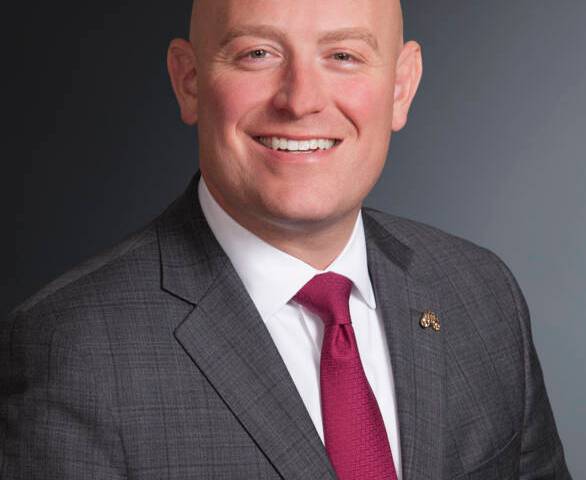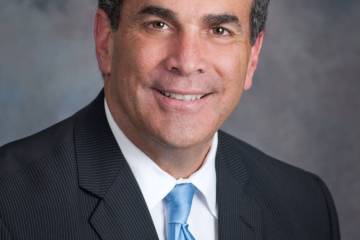For most Nevadans, the 2015 legislative session will be remembered for Gov. Brian Sandoval’s successful campaign to pass a $1.1 billion tax package, with much of the new funding going to efforts at reforming education or paying for new programs.
Beyond education, there were other crucial bills that flew under the radar. Several of those pieces of legislation had been supported by or lobbied against by Nevada’s credit union industry.
The Nevada Credit Union League, which represents 18 credit unions statewide, recently highlighted several bills in its legislative wrap up, a session they described as “successful” for credit unions.
“This session showed credit union advocacy at its finest, with credit unions and the (NCUL) doing a fantastic job during a very challenging and intense legislative session,” said Wally Murray, chairman of the Nevada Credit Union League and CEO of the Greater Nevada Credit Union in Carson City.
Murray said it was critical that credit unions stepped up during the session “to make sure legislators are aware of our positions on key issues.” One of those measures the industry was lobbying for was Senate Bill 306.
The bill made sure homeowners associations notified lien holders of delinquent HOA assessments on homes, allowing credit unions and other lenders to pay off the dues and avoid a foreclosure sale.
It also offers lien holders and homeowners a redemption period to recover the property if the delinquent assessments are not paid before a foreclosure sale. SB 306, which was co-authored by Sens. Scott Hammond, R-Las Vegas, and Minority Leader Aaron Ford, D-Las Vegas, was signed in late May by Gov. Brain Sandoval.
The Nevada Credit Union League also helped defeat Senate Bill 269 and Assembly Bill 240. Both bills would have required credit unions to impound HOA dues in escrow accounts for all new home loans in an HOA and pay the dues through those accounts.
Credit unions also got a break in Sandoval’s $1.1 billion new revenue package. According to the Nevada Credit Union League, the law bill exempted credit unions from the modified business tax and commerce tax.
Business license fees for Nevada’s credit unions also stayed at $200.
Lawmakers also passed and the governor signed Senate Bill 512, putting a two-year sunset on the foreclosure mediation program, which would end the program in 2017.
Wayne Tew, the outgoing CEO and president of Clark County Credit Union, described the resent legislative session as “one of the most active” he’s observed in his 30 years in the financial industry.
Tew added that the “proactive involvement” of credit union CEOs and others “was critical in the accomplishment of credit union objectives this year.”
CCCU posts strong earnings
Tew’s career with Clark County Credit Union is coming to an end this month. But the 30-year veteran of the Las Vegas-based credit union is leaving with his business safely in the black.
Clark County Credit Union posted second-quarter earnings that averaged $1.1 million a month, with a total of $6.62 million for the first six months of 2014.
“We had such as strong year (2014) and I was very satisfied with our performance,” Tew said. “Clark County Credit Union’s second quarter reflects continued strength and our focus on the core essentials of long-term growth.”
The credit union ended 2014 with net income of nearly $12.3 million. In a statement, Clark County Credit Union attributed its second-quarter growth in part to a continued reduction of loan loss provisions, and improved commercial and consumer conditions.
Growth also played a factor, with the credit union reporting a 9.26 percent asset growth ratio, boosted by growing membership numbers and borrowing levels. Tew also said he was pleased with the credit union’s 2.4 percent year-to-date return on assets ratio.
As of June 30, Clark County Credit Union had a net worth of 11.95 percent.
“We’ve had good results based on a deliberate shift in our marketing strategy and direction over the last several months,” said Mark Andrews, chief marketing officer. The result, Andrews said, has brought Clark County Credit Union above 35,000 members.
“We are confident in our ability to meet the goal of 37,000 members by the end of 2015,” Andrews said in a second-quarter earnings release.
Tew also expects to see a strong bonus dividend again in January. The credit union awarded $2.7 million this year to nearly 34,000 members in the form of a bonus dividend.
Since 2000, Clark County credit Union has given its members more than $50 million in annual bonus dividends. This year’s bonus dividend was the first one issued to members since 2008.
In other news
• City National Corp., the parent company of City National Bank, has reported strong second-quarter earnings that include the bank’s highest-ever net income. City National Bank, which operates seven branches in Nevada, reported net income of $68.5 million, or $1.13 a share, compared with $65.5 million, or $1.09 a share, for the same period last year. Wall Street analysts had expected net income of $1.08 a share.
• Valley Bank of Nevada has expanded into Henderson with the opening of a business loan center. James York, president and CEO, says by the middle of next year Valley Bank of Nevada will open a second full service branch. The bank operates one branch in North Las Vegas. Valley Bank of Nevada reported a second-quarter loss of $81,000.
• Nevada’s largest credit union continues to post increases in its quarterly revenues. One Nevada Credit Union earned $4.54 million in the second quarter, compared to $3.25 million for the same period last year. One Nevada said its loan loss provision for the second quarter was $732.961, a decrease from $876,603 in the second quarter of 2014.
• East West Bancorp Inc. reported second-quarter earnings that beat analyst expectations. For the three months ended June 30, the parent of East West Bank, earned net income of $98.7 million, or 68 cents per share, up 17 percent from income of $84.3 million, 59 cents per share, in the same period last year. Analysts had expected income of 65 cents per share.






